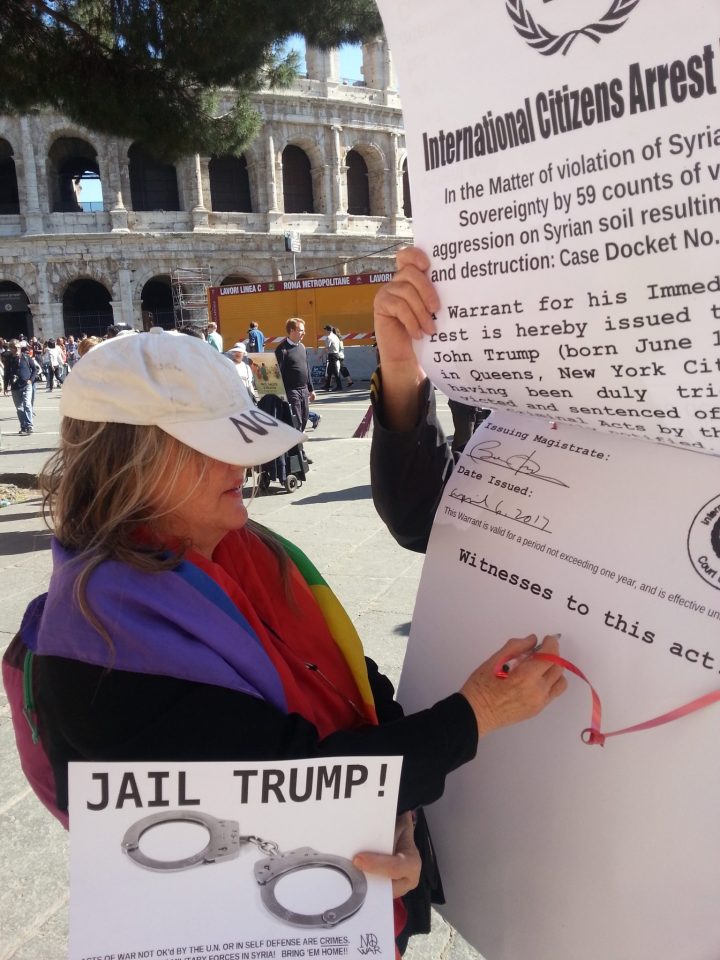Most states allow a “citizen’s arrest” of whoever is caught committing a felony, should the police fail to intervene. Since Trump’s missile attack against Syria constituted a crime of aggression (a felony) and since no law enforcement agency has acted as of yet, a citizen’s arrest may indeed be in order. At least, that’s what two peace groups in Rome think.
On Sunday, April 9th, outside the Colosseum in Rome, Italy, two peace groups displayed a poster-sized document calling for the arrest and incarceration of U.S. President Trump and asked the American tourists visiting the monument to sign it. Dozens did.
The document, prepared by U.S. Citizens for Peace & Justice and the NoWar Network in Rome, stated that the 45th U.S. President had committed the crime of “aggression against a sovereign state”, which is a felony, by launching a missile attack on Syria without U.N. approval and without there being any imminent danger to U.S. security. In addition, the attack illegally sidestepped the Constitutional right of Congress to approve acts of war. (Of course, Trump is not the first President to usurp Congressional prerogatives, but the illegality remains – see why in this New York Times article.)
What is more, the form of the peace groups’ document was singular indeed. It was not the usual petition asking to hold Trump accountable but rather an “International Citizens’ Arrest Warrant”, calling for the immediate arrest, by any U.S. citizen, of one Donald J. Trump, born June 14, 1946 in New York City.
Most states have Penal Codes which expressly authorize private citizens to arrest anyone caught committing a felony or who is known to have committed a felony, when law enforcement agencies cannot or do not intervene or are taking too long to intervene. This is to prevent a felon from escaping or, in a case like that of President Trump, from repeating his criminal behavior before being locked up (see, for example, Trump’s threats to assail North Korea and Yemen which he could enact at any time).
Citizens’ arrests are normally spontaneous and carried out without a warrant. But in the present case, the peace groups wanted to confer greater solemnity to their call by elaborating a giant, mock, “people’s” Arrest Warrant pretending to be issued by the International Common Law Court of Justice. Although the warrant itself is just a mashup, the signatures on it testify as to the “popular” (widely-felt) character of its call to arrest Trump. A few of the signers are pictured here, along with a photo of the warrant itself.
Signatures were gathered once again three days later, on April 12th, in piazza Barberini in Rome, a couple of blocks away from the U.S. embassy there. The occasion was a sit-in against Trump’s escalation in Syria organized by the EuroStop movement and two parties on the left of the Italian political spectrum. A picture of the event can be seen by clicking here.
Trump, in any case, unchecked, seems determined to continue to abuse his Constitutional powers: in the past week he has threatened North Korea with a military strike, in violation of article 2, paragraph 4, of the U.N. Charter which Congress has ratified, thus making it U.S. law; and he has announced his will to join Saudi Arabia in bombing the Yemeni people, as well as starving them to death by blocking their only seaport where food supplies necessarily transit. This is tantamount to genocide.
All of which means that U.S. Citizens for Peace & Justice and the NoWar Network in Rome will have to start preparing other Arrest Warrants for Trump, in the hope that a brave New York resident will, one morning, decide to wait for President Trump outside his Tower when he is in town and attempt, if not a full citizen’s arrest, at least a notification of the people’s warrant to arrest him. That jolt might help him remember his campaign promises, among which the refusal to get involved in more foreign wars and, indeed, the resolve to exit the seven worldwide conflicts begun or continued by his predecessor – the Nobel Peace Prize winner Barack Obama.










